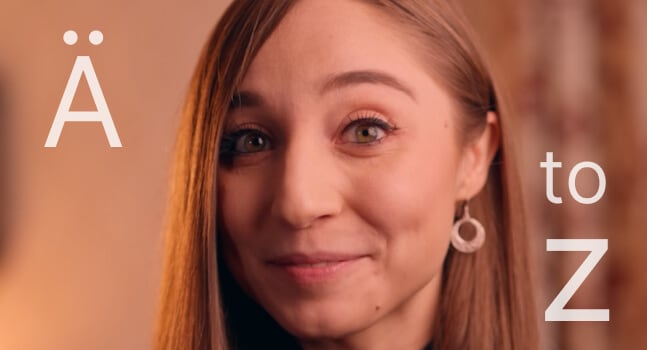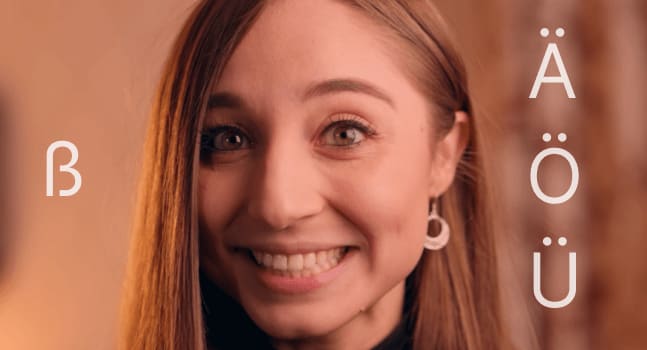German Alphabet Pronunciation (Ultimate Guide, Every Letter)
October 21, 2022

Take control of your German pronunciation with this ultimate guide. Enjoy pronunciation tips and audio for every single letter!
In this guide, you’ll find:
- Pronunciation tips for every letter, as well as key letter combinations (like CH)
- Detail for letters that make more than one sound (Many resources skip this)
- Example audio for each sound
- A powerful way to sharpen your pronunciation with interactive practice and feedback (No more practicing in the mirror!)
What you need to know first:
- The German alphabet uses the same twenty-six letters as the English alphabet, plus it has four unique letters.
- Many German letters are pronounced the same as in English, but of course some pronunciations are distinct and take practice.
- We will be covering standard Northern German pronunciation. There are regional variations you will encounter as you hear more German.
1. First - RELAX - 3 reasons why you don't have to fear German pronunciation!
German pronunciation can certainly feel scary. However, don’t let this intimidate you one bit!
First, rest easy that pronunciation nuances rarely hinder communication. Even when your pronunciation may not be picture perfect, you will be able to convey your message.
Secondly, German is a phonetic language. Therefore, once you know how to pronounce each letter and sound, you’ll even be able to correctly pronounce words that you’ve never encountered before (even really long ones!)
A third piece of of good news? There are a number of German letters and letter combinations that are pronounced similarly to English.
2. The Four Distinct Letters in German

German has four letters that do not exist in the English alphabet:
- Ess-tset ß: This letter looks different, but there is an equivalent sound in English
- Three umlauts: The two dots over each vowel change how the letter is pronounced. Each umlaut has both a long and a short pronunciation, just like their vowel counterparts.
| Example Word | |||
|---|---|---|---|
| Letter | German | English | Similar English Sound |
| ß | groß | big | "ss” sound in miss |
| Ä | Äpfel | apples | short: "e" in set |
| Ä | Käfer | beetle | long: no equivalent; start with short-Ä and lengthen it |
| Ö | Höhle | cave | long: no equivalent; like you're disgusted |
| Ö | öffnen | to open | short: no equivalent; shorter-Ö sound; tenser, more open |
| Ü | üben | to practice | long: no equivalent; like you've smelled something unpleasant |
| Ü | Lücke | gap | short: no equivalent; shorter Ü-sound; less lip rounding |
There are helpful tips and tricks you can use to produce these distinct sounds.
In Kleo's pronunciation series, featuring interactive video lessons, you can learn these powerful tips and even practice speaking "face-to-face" with top German experts and YouTube star Feli from Germany.
Here's where you can explore more about these distinct letters:
- ß Pronunciation And Meaning (It’s Easier Than It Looks)
- Ä Pronunciation Tips (How To Handle A Umlaut Like a Pro)
- O Umlaut Made Easy (Ö Pronunciation Guide)
- U Umlaut Simplified Like Never Before (Ü Pronunciation Tips)
3. The Twenty-Six Letters Shared with English
When it comes to the letters that German shares with English, here are some points to note:
- Vowels: Every German vowel has two pronunciations - long and short
- Alternate sounds: Some letters make more than one sound, depending on the linguistic context
- Distinct sounds: Some German letters do not have an equivalent sound in English. You can learn to make these sounds with practice
Here is a comprehensive guide to help keep it all straight:
| Example Word | |||
|---|---|---|---|
| Letter | German | English | Similar English Sound |
| A | Rat | advice | long: "a" in father |
| A | Ratte | rat | short: no equivalent; really short German A |
| B | Banane | banana | start/mid of word: "b" in banana |
| B | Laub | leaves | end of word: "p" in pop |
| C | Cola | cola | start of word (not in combo): "k" in kid |
| D | denn | because | start/mid of word: "d" in dog |
| D | Hund | dog | end of word: "t" in hot |
| E | sehr | very | long: no equivalent; like "ay" sound when shrugging at something mediocre |
| E | Bett | bed | short: like "e" in bet; stressed sound |
| E | bitte | please | end of word: "a" in adorable; short, unstressed sound |
| F | Fisch | fish | "f" in fish |
| G | gehen | to go | start/mid of word: "g" in go |
| G | klug | intelligent | end of word: like "k" in kid |
| H | Hunger | hunger | "h" in home |
| I | Idee | idea | long: "e" in eat |
| I | immer | always | short: "i" in in |
| J | ja | yes | "y" in young |
| J | Jeans | jeans | loan words: "j" in jam |
| K | Kinder | children | "k" in kid |
| L | lernen | to learn | "l" in look |
| M | Mann | man | "m" in man |
| N | nein | no | "n" in no |
| O | Obst | fruit | long: "o" in oval |
| O | Gott | God | short: "o" in British word not |
| P | Party | party | "p" in party |
| Q | Qualität | quality | occurs as "QU"; no equivalent; pronounced as "kv" |
| R | rot | red | start of word: no equivalent; consonantal r (gargling) |
| R | fahren | to drive | before vowel: no equivalent; consonantal r (gargling) |
| R | Wasser | water | end of word: no equivalent; vocalic r (barely there) |
| R | werden | to become | before consonant: no equivalent; vocalic r (barely there) |
| S | Sohn | son | start of word: "z" in zoo |
| S | Haus | house | mid/end of word: "s" in sink |
| T | Tasse | cup | "t" in tea |
| U | Kuh | cow | long: “u” in flute |
| U | Fluss | river | short: “u” in put |
| V | Vater | father | "f" in father |
| V | Vase | vase | loan words: "v" in van |
| W | Wasser | water | "v" in van |
| X | Xylophon | xylophone | no equivalent; pronounced as "ks" |
| Y | Yoga | yoga | start of word: "y" in yoga |
| Y | typisch | typical | mid-word: no equivalent; like German Ü |
| Y | Handy | cell phone | end of word: "y" in hobby |
| Z | zehn | ten | "ts” sound in cats |

Come back to this guide whenever you need a reminder of how to pronounce a specific letter. As you speak more German, your pronunciation will start to flow more naturally and with ease.
In the Kleo app, powered by revolutionary interactive video technology, you can practice speaking German with top experts anytime. This risk-free practice is a great way to build your confidence and get the productive feedback you need to improve. By pushing yourself to speak as much as you can, you will be sharpening your pronunciation as you go.
Read more about important German sounds here:
- Pronounce The German R Right (Tips, Audio For Both R Sounds)
- How To Pronounce The German Z (Pizza Anyone?)
- Meet The World's First-Ever Virtual Pronunciation Coach
4. Important Letter Combinations (Vowel)
German has several vowel combinations, wherein two vowels combine to make a different sound:
| Example Word | |||
|---|---|---|---|
| Combo | German | English | Similar English Sound |
| AI | Mai | May | like letter “i” in English alphabet |
| EI | mein | my | like letter “i” in English alphabet |
| IE | Lied | song | like letter “e” in English alphabet |
| EY | Hockey | hockey | loan words: like letter “e” in English alphabet |
| AU | Haus | house | "ow” sound in loud |
| OU | Account | account | "ow” sound in loud |
| OU | Route | route | "u” in rule |
| EU | heute | today | “oy” sound in toy |
| ÄU | Bäume | trees | “oy” sound in toy |
You can read more about the EI and IE combinations and learn a helpful rule to pronounce these correctly every time. In addition, see how you can even practice these combos "face-to-face" with YouTube star Feli from Germany:
5. Important Letter Combinations (With Consonants)
German also has several important letter combinations with consonants. You'll see two or more letters combine to make a different sound:
| Example Word | |||
|---|---|---|---|
| Combo | German | English | Similar English Sound |
| CH | Nacht | night | after A/O/U/AU: no equivalent; guttural ach-sound |
| CH | ich | I | after all other letters except S: no equivalent; soft ich-sound |
| CH | Chance | chance | loan words: "sh" sound in sheep |
| SCH | Schule | school | "sh" sound in sheep |
| CHS | sechs | six | “x” in fox |
| IG | fertig | finished | end of word: no equivalent; soft CH ich-sound |
| CK | lecker | delicious | “ck” sound in check |
| NG | Engel | angel | "ng" sound in ring |
| NK | Danke | Thanks | "nk" sound in bank |
| SP | sprechen | to speak | start of word: no equivalent; pronounced like "shp" |
| SP | Wespe | wasp | mid/end of word: "sp" sound in lisp |
| ST | Stadt | city | start of word: no equivalent; pronounced like "sht" |
| ST | fast | almost | mid/end of word: "st" sound in stop |
| SS | Essen | food | "ss” sound in miss |
| TH | Theater | theater | loan words: "t” in hot |
With practice, you can refine your pronunciation of these letter combinations, including the prevalent CH. In the Kleo app, you can even get real-time feedback on your pronunciation, practicing until you get the sounds just right. You can read more here:
- Mastering CH Pronunciation in German
- How to Pronounce Ich In German
- How To Pronounce IG In German
- Meet The World's First-Ever Virtual Pronunciation Coach
6. How can I refine my German pronunciation?
Keep pushing to share your thoughts, even when you are unsure of the exact sounds! The more you do this, the more your pronunciation will improve naturally!

- Get feedback on your pronunciation to improve: Check out the interactive video pronunciation lessons in Kleo. You can practice the pronunciation of specific sounds and words, as if you were face-to-face with German friends, including YouTube star Feli from Germany. You can practice with her and top German experts anytime, receiving the consistent and productive feedback you need to improve.
- Practice in context: The best way to build muscle memory is to use new sounds and words in real-life situations. Kleo’s popular interactive video lessons unlock a powerful way to practice speaking German in context, refining your pronunciation as you go.